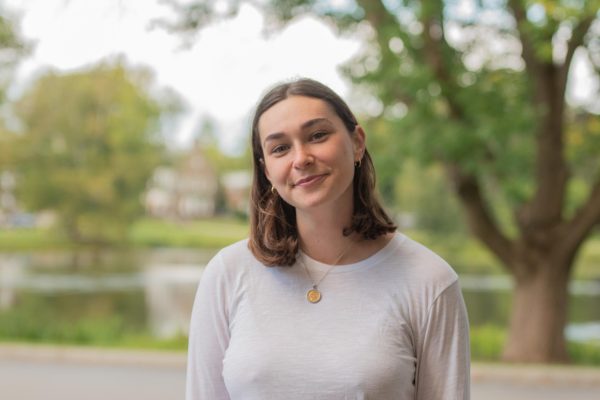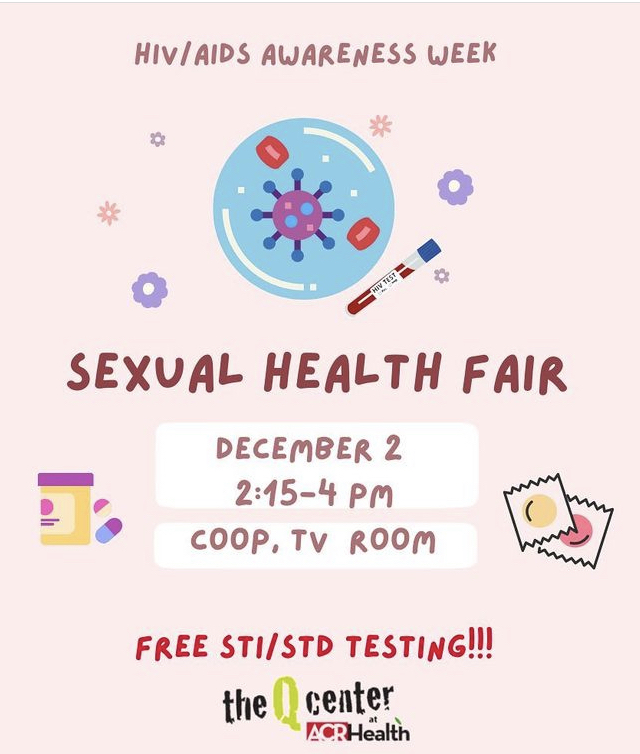Office of LGBTQ+ Initiatives and Student Health Services Host Sexual Health Fair
The Office of LGBTQ+ Initiatives and Student Health Services held a Sexual Heath Fair on December 2 in the O’Connor Campus Center (Coop). The fair included STI/STD testing, provided by the Q Center, an LGBTQ youth organization at the Syracuse-based healthcare non-profit organization ACR Health.
Dr. Lyosha Gorshkov, the director of LGBTQ+ Initiatives, explained that the objectives of the fair were focused around educating students about how they can prevent themselves from contracting STIs, including HIV/AIDS.
“We’re here to provide students and everyone who is interested with resources on STDs, STIs, HIV prevention and AIDS prevention,” Gorshkov said.
In fact, Gorshkov considers education and awareness initiatives like this fair to play a critical role in HIV/AIDS prevention.
“Sex education is the key to prevention,” Gorshkov said. “The preventative care is to give you the tools on how you can secure your body, how you can prevent certain things from happening, and if they happen, what steps to take not to freak out, because [HIV/AIDS] is not the death sentence it was.”
First-year Brian Pallares found that events at Colgate including the fair and the Sex Museum that took place earlier in the semester were indeed helpful in teaching him about sexual health, attitudes towards sex education and the availability of STI testing options.
“It was informative. Colgate is pretty solid on [sex education],” Pallares said. “It’s available, it’s free, it’s accessible.”
The fair was a collaboration between the nonprofit arts organization Visual AIDS, the LGBTQ Studies Program at Colgate, Haven and the Student Health Center, as well as various student organizations. Gorshkov considered the collaborative nature of the project to be indispensable to its success.
“You cannot combat certain things on your own, and you definitely cannot take the task to educate the campus alone,” Gorshkov said.
The sexual health fair was part of the Colgate HIV/AIDS Awareness Week hosted by the Office of LGBTQ+ Initiatives from Nov. 28 to Dec. 2, organized to coincide with World AIDS Day on Dec. 1. Other events during the week included panel discussions on facts and myths of HIV and past lessons from the history of HIV as well as a film screening of Day With(out) Art 2022, produced and published by Visual AIDS.
Although Colgate hosted the Visual AIDS film screenings in previous years, this is the first time that Colgate organized a whole week of events centered around HIV/AIDS awareness. According to Gorshkov, the overall purpose of the week was to help educate students who did not experience the AIDS epidemic of the late 20th century about the consequences of HIV/AIDS.
“We found out that a lot of people from Generation Z do not know anything about HIV and AIDS,” Gorshkov said. “It’s to raise awareness among the student body that those medical conditions are still present and that we have to be mindful that some people still get them.”
Though Gorshkov and the Office of LGBTQ+ Initiatives hosted this week because of the historical significance of HIV/AIDS to the LGBTQ+ community, Gorshkov wished to clarify the fact that HIV/AIDS affects everyone, no matter their sexual identity.
“HIV/AIDS always was labeled as a ‘gay disease,’ and HIV/AIDS are still more present in particular demographics,” Gorshkov said. “But it’s related to our mission to make sure that people understand that HIV/AIDS is a common universal issue, to diminish and deconstruct some stereotypes.”
Regarding future events on sexual health education at Colgate, Gorshkov has plans to expand the frequency of initiatives hosted by the Office of LGBTQ+ Initiatives.
“There are so many aspects of our health and our sexuality that could be pointed at during this period of time, but of course, it should be a constant education. Not only one day, not only one week,” Gorshkov said.
The student body was also optimistic about how sexual health programs at Colgate University could become more comprehensive and accessible in the future. First-year Boen Beavers offered an opinion on improving education on safe sex practices and maintenance of sexual health.
“I know of a lot of different programs that are in operation, but as with anything else, there’s always more work to be done,” Beavers said. “I think that they could have worked [sexual health education] into the orientation training, or similar to the sexual harassment and violence program, they could have made it a mandatory thing.”
Ultimately, Gorshkov, too, is confident that sexual health education at Colgate — and future sexual health fair programming — will only improve. Gorshkov is also enthusiastic about upcoming sexual health fair programming moving into next semester and next year, hoping that more and more students will attend these relevant events.
“I’m so excited about our collaborations, because so far it’s worked out beautifully,” Gorshkov said. “This is an event for everyone, because the goal of our partnership is to make students aware about not only HIV/AIDS, but about other STDs, [too]. This is about your body health.”

Sophie Karbstein is a sophomore from Jupiter, FL concentrating in Russian and peace and conflict studies. She has previously served as a staff writer for...







